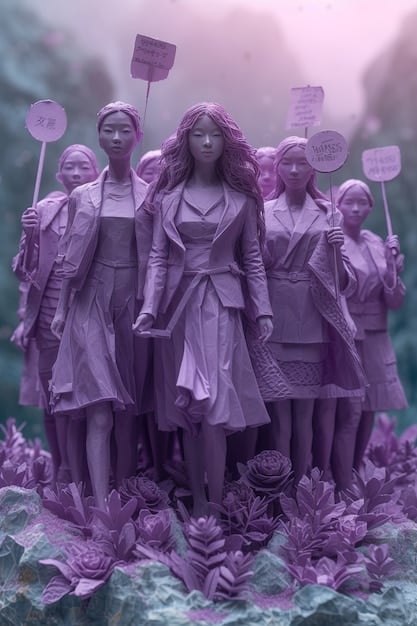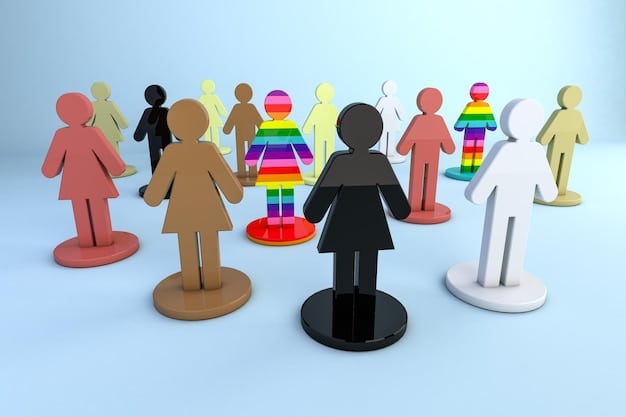What are the Key Tenets of Feminist Literary Criticism in American Literature 2025?

What are the Key Tenets of Feminist Literary Criticism and Their Application to American Literature in 2025? Feminist literary criticism examines literature through a feminist lens, exploring gender dynamics, power structures, and female representation. In 2025, it continues to evolve, addressing contemporary social issues and diverse voices in American literature.
Feminist literary criticism offers a powerful lens through which to examine the intricate tapestry of American literature. But what does this perspective entail, and how might it shape our understanding of American literary works in the year 2025?
Let’s delve into what are the Key Tenets of Feminist Literary Criticism and Their Application to American Literature in 2025?, exploring its core principles and how they might manifest in future literary analyses, promoting inclusivity within American literature.
Understanding the Foundations of Feminist Literary Criticism
To fully appreciate its application to American literature in 2025, it’s crucial to first understand the foundational principles of feminist literary criticism. This approach challenges traditional, often patriarchal, interpretations of literature, seeking to uncover biases and promote more inclusive readings.
Core Principles of Feminist Literary Criticism
Feminist literary criticism is guided by several key principles, each playing a vital role in reshaping our understanding of literary works.
- Examining gender roles and stereotypes within literature.
- Analyzing power dynamics between men and women in the text.
- Uncovering the female experience and perspective.
- Challenging traditional literary canons that marginalize female authors.
These principles collectively contribute to a more nuanced and equitable understanding of literature.
Historical Evolution of Feminist Literary Thought
Feminist literary criticism has evolved significantly over time, influenced by various waves of feminism, each with its unique focus and concerns.
From the early focus on female representation to more recent explorations of intersectionality and gender fluidity, feminist literary criticism has adapted to reflect changing social and political landscapes.

This historical evolution has enriched the field, resulting in a more diverse and inclusive approach to literary analysis.
In summary, the foundations of feminist literary criticism lie in its core principles and historical evolution, providing a framework for analyzing literature through a gender-conscious lens and with considerations to what are the Key Tenets of Feminist Literary Criticism and Their Application to American Literature in 2025?
The Evolving Landscape of American Literature in 2025
Before we consider the application of feminist literary criticism, it’s important to understand the evolving landscape of American literature in 2025. Technological advancements, shifting demographics, and changing social values all contribute to the creation and reception of literary works.
Technological Influences on Literature
Technology has not only changed how literature is created and distributed but also how we interact with it. Digital platforms and social media are reshaping the literary landscape.
The rise of e-books, audiobooks, and online literary communities has broadened access to literature, fostering new forms of engagement and discussion.
Demographic and Social Shifts
American society is becoming increasingly diverse, and this is reflected in the themes and characters explored in contemporary literature. There is a growing demand for diverse voices and stories that reflect the lived experiences of marginalized communities, directly impacting what comprises what are the Key Tenets of Feminist Literary Criticism and Their Application to American Literature in 2025?.
- Increased representation of LGBTQ+ characters.
- Exploration of racial and ethnic identities.
- Focus on socio-economic disparities and their impact on individuals.
These shifts are challenging traditional literary norms and fostering a more inclusive and representative literary canon.
Changes in literature are paving the way for new perspectives in literary criticism.
The evolving landscape of American literature in 2025 is marked by technological influences and demographic shifts, shaping the themes and characters explored in contemporary literature, impacting what are the Key Tenets of Feminist Literary Criticism and Their Application to American Literature in 2025?.
Applying Feminist Literary Criticism: Key Areas of Focus in 2025
With an understanding of both feminist literary criticism and the evolving landscape of American literature, we can now consider how these two intersect in 2025. Feminist literary criticism will likely focus on several key areas.
Analyzing Gender Representation in Contemporary Novels
One key area of focus will be analyzing how gender is represented in contemporary novels.
This involves examining the roles, stereotypes, and power dynamics assigned to male and female characters. It also includes investigating how authors challenge or perpetuate traditional gender norms.
Examining Intersectionality in Literary Works
Intersectionality, the interconnected nature of social categorizations such as race, class, and gender, will also be a crucial area of focus.
Feminist literary criticism in 2025 will analyze how these various social identities intersect to shape the experiences of female characters.
This comprehensive approach requires an understanding of the tenets associated with what are the Key Tenets of Feminist Literary Criticism and Their Application to American Literature in 2025? so as to successfully examine modern literature.

Reclaiming and Reinterpreting Classic Texts
Feminist literary criticism continues to play a vital role in reclaiming and reinterpreting classic texts.
By challenging traditional, often patriarchal, interpretations of these works, critics can uncover hidden meanings and perspectives, shedding light on the female experience and challenging the established literary canon.
As a conclusive point, feminist literary criticism in 2025 will focus on analyzing gender representation, examining intersectionality, and reclaiming classic texts, impacting what are the Key Tenets of Feminist Literary Criticism and Their Application to American Literature in 2025?.
Challenges and Opportunities for Feminist Literary Criticism
Despite its ongoing influence, feminist literary criticism faces several challenges and opportunities in 2025. Addressing these challenges will be essential for the continued growth and relevance of the field.
Confronting Resistance to Feminist Interpretations
One significant challenge is confronting resistance to feminist interpretations of literature.
Some critics and readers may resist feminist readings, viewing them as biased or politically motivated. Overcoming this resistance requires clear and compelling arguments supported by robust evidence.
Embracing Diverse Feminist Perspectives
Feminist literary criticism encompasses a range of perspectives and approaches. Embracing this diversity is essential for the continued growth and relevance of the field.
Different feminist perspectives can offer unique insights into literary works, enriching our understanding of gender, power, and representation. Understanding the importance as to what are the Key Tenets of Feminist Literary Criticism and Their Application to American Literature in 2025? aids in confronting challenges.
- Incorporating perspectives from women of color.
- Including voices from the LGBTQ+ community.
- Acknowledging the experiences of women from different socio-economic backgrounds.
These aspects help to ensure feminist literary thought stays current.
Feminist literary criticism must balance confronting resistance and embracing diverse perspectives to remain relevant.
As such, feminist literary criticism faces challenges in confronting resistance and opportunities in embracing diverse perspectives, influencing what are the Key Tenets of Feminist Literary Criticism and Their Application to American Literature in 2025?.
Case Studies: Feminist Literary Criticism in Action
To illustrate the practical application of feminist literary criticism, let’s examine a few case studies involving contemporary American literary works.
Analyzing Gender Dynamics in Sarah Waters’ “The Paying Guests”
Sarah Waters’ “The Paying Guests” offers a rich example for feminist literary analysis.
By examining the gender dynamics between the female characters and the social constraints they face, critics can uncover nuanced insights into the challenges of female agency and desire.
Exploring Female Identity in Tayari Jones’ “An American Marriage”
Tayari Jones’ “An American Marriage” provides an opportunity to explore the complexities of female identity in the context of racial injustice.
Feminist critics can analyze how the protagonist’s identity is shaped by her experiences as a Black woman in America, and how her marriage is impacted by systemic racism and incarceration, addressing what are the Key Tenets of Feminist Literary Criticism and Their Application to American Literature in 2025?.
These case studies provide tangible examples of the benefits of feminist literary analysis.
In brief, analyzing gender dynamics and identity allows critics to use concrete examples to evaluate feminist applications.
Analyzing these cases shows how feminist literary criticism can be applied, to understand gender dynamics, ultimately reinforcing what are the Key Tenets of Feminist Literary Criticism and Their Application to American Literature in 2025?.
The Future of Feminist Literary Criticism
As we look ahead to the future of feminist literary criticism, several trends and developments are likely to shape the field. By adapting to these changes, feminist literary criticism can continue to play a vital role in promoting more inclusive and equitable readings of literature.
Incorporating Digital Humanities and Computational Analysis
Digital humanities and computational analysis offer new tools and techniques for feminist literary criticism.
By employing text mining, data visualization, and other digital methods, critics can gain insights into gender representation, power dynamics, and other key themes, furthering what are the Key Tenets of Feminist Literary Criticism and Their Application to American Literature in 2025?.
Fostering Interdisciplinary Collaboration
Fostering interdisciplinary collaboration can enrich feminist literary criticism by integrating insights from other fields, such as sociology, psychology, and history.
By drawing on these diverse perspectives, critics can develop a more comprehensive and nuanced understanding of gender, power, and representation in literature.
Collaboration can help to ensure the continued growth of feminist literary concepts.
Consequently, by incorporating digital humanities and fostering interdisciplinary collaboration, feminist literary criticism can continue to flourish.
In conclusion, the future of feminist literary criticism involves digital humanities and interdisciplinary collaboration, which affects what are the Key Tenets of Feminist Literary Criticism and Their Application to American Literature in 2025?.
| Key Point | Brief Description |
|---|---|
| 📚Foundations | Core principles challenge norms, advocating inclusivity. |
| 🌎 American Lit ’25 | Tech and demographic shifts influence contemporary literature. |
| 🚺 Key Areas | Focus on gender, intersectionality, and classic reinterpretation. |
| 🔮 Future | Incorporating digital methods and interdisciplinary collaboration. |
Frequently Asked Questions
The main goals include identifying gender bias, promoting female authors, and reinterpreting texts to focus on female experiences. These goals address what are the Key Tenets of Feminist Literary Criticism and Their Application to American Literature in 2025?
It has evolved from focusing on female representation to include intersectionality and a broader approach to gender studies. This evolution reflects changing social and political landscapes.
Intersectionality examines how various social identities combine to shape individual experiences in literature. The understanding of what are the Key Tenets of Feminist Literary Criticism and Their Application to American Literature in 2025? helps in better understanding.
Technology influences the creation, distribution, and engagement with literature through digital platforms. Digital humanities offer new avenues for analyzing texts and their hidden meanings.
Despite social changes, feminist literary criticism continues to offer valuable analysis of gender, power, and representation in literature. As well, exploring what are the Key Tenets of Feminist Literary Criticism and Their Application to American Literature in 2025? keeps the concept prevalent.
Conclusion
Feminist literary criticism will continue to play a crucial role in shaping our understanding of American literature in 2025. As themes and characters evolve, so will the analytical tools employed by literary critics today.
By recognizing what are the Key Tenets of Feminist Literary Criticism and Their Application to American Literature in 2025?, and by embracing diversity and adaptability, feminist literary criticism can foster more inclusive and revealing readings of the stories that define us.





